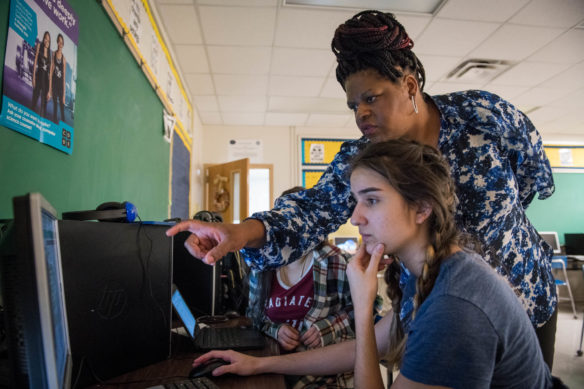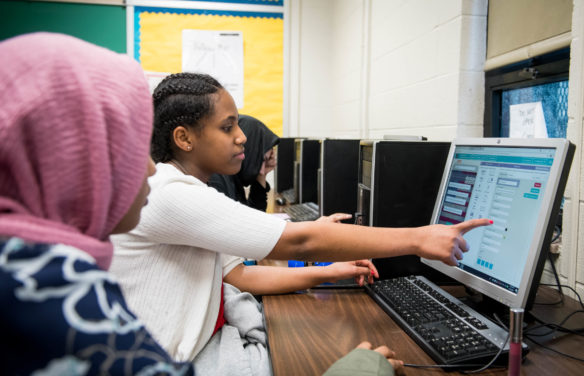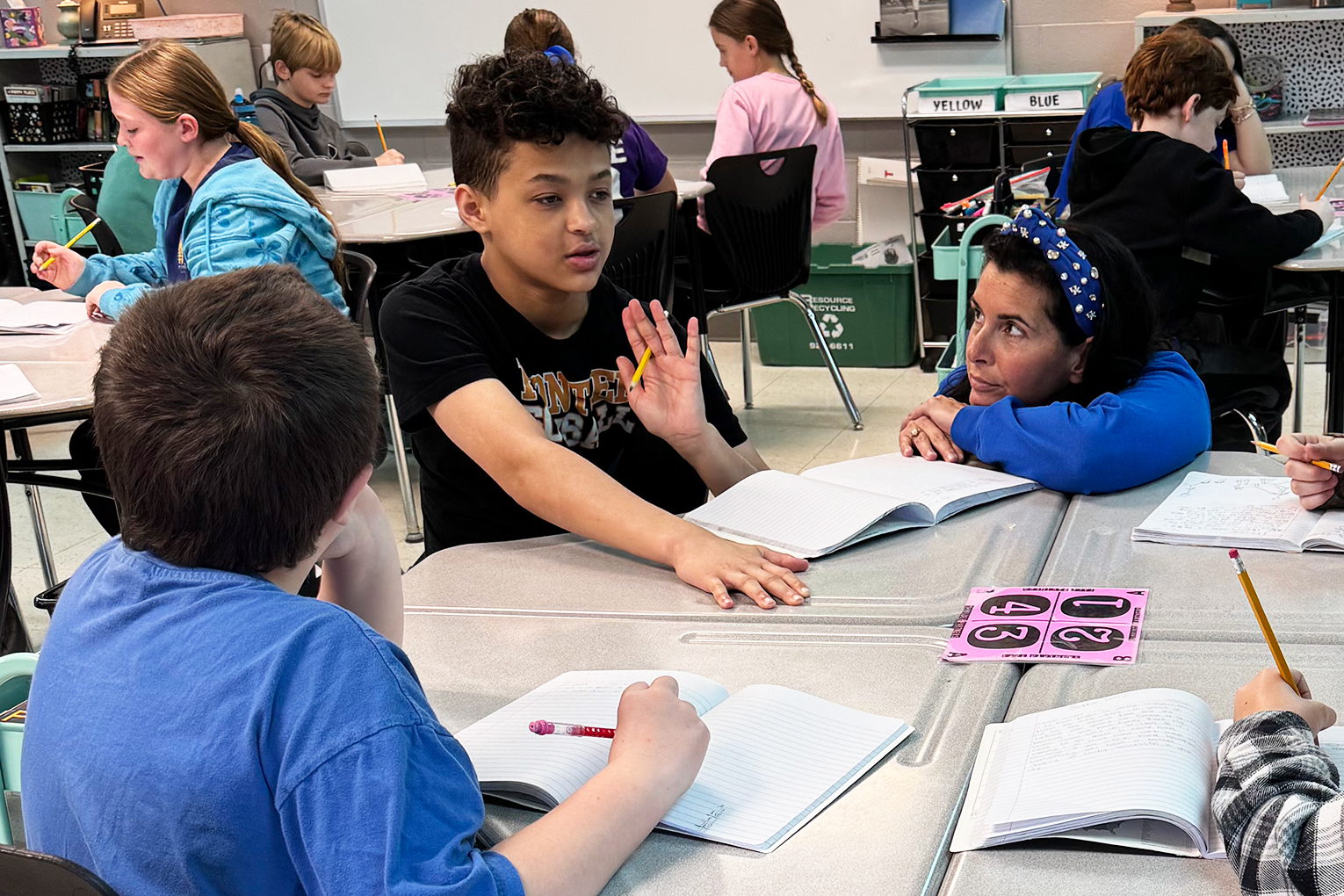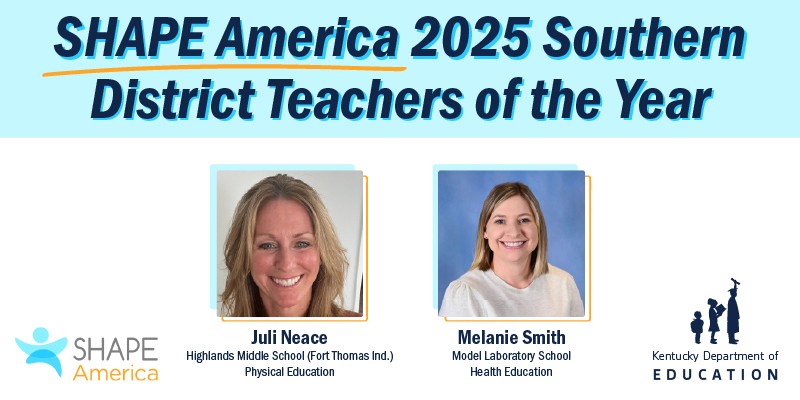
Teacher Aneesah Nu’Man, right, works with Yennifer Coca during her AP Computer Science Principles class at Iroquois High School (Jefferson County). Nu’Man is one of more than 100 teachers across the state now teaching computer science thanks to the computer science initiative, which includes a professional learning component aimed at training computer science teachers.
Photo by Bobby Ellis, April 23, 2018
By Brenna R. Kelly
Brenna.kelly@education.ky.gov
In Aneesah Nu’Man’s AP Computer Science Principles class at Iroquois High School, her 14 students come from 10 different countries and speak 10 different languages.
They are just the kinds of students the Kentucky Department of Education (KDE) was hoping to reach when it launched an effort last fall to expand access to and participation in computer science courses at all grade levels and to bring advanced course work to underserved populations of students.
And Nu’Man, an English teacher at the Jefferson County school, is just the kind of teacher the department was looking for to bring computer science to an expanded population of students.
“I’m a scientist at heart, but as a youngster, I needed a different approach to math instruction. I just didn’t feel confident enough to major in it in college,” said Nu’Man, who has been teaching in Jefferson County for 16 years, the past six at Iroquois.
So when she heard about the opportunity to learn how to teach computer science, Nu’Man jumped at the chance. Nu’Man is one of more than 100 teachers across the state now teaching computer science thanks to the computer science initiative, which includes a professional learning component aimed at training computer science teachers. Those teachers are trained to teach one of three courses; Computer Science Discoveries for grades K-5, Computer Science Fundamentals for grades 7-9 or AP Computer Science Principles for grades 10-12.
“The internet is a fascinating concept,” Nu’Man said. “And coding is a good way to teach critical thinking skills to our students.”
The initiative is a partnership between KDE, Code.org, College Board and AdvanceKentucky.
“Computer science offers students much more than just the knowledge about how computers work or the skills needed to build a device, write code or manage data,” said Scott U’Sellis, an information technology/media arts consultant at KDE. “Today in the global labor market, the knowledge of computational thinking skills are required in nearly all career fields.”
In 2017, there were more than 500,000 unfilled computing jobs in the U.S. in sectors ranging from manufacturing to agriculture to health, according to Code.org and the Computer Science Education Coalition. But there were only about 50,000 computer science graduates ready to fill those jobs.
In addition to new computer science classes, the KDE initiative also includes developing computer science standards. The Kentucky Academic Standards for Computer Science, which are set to be presented to the Kentucky Board of Education in June, are designed to expose more students to critical thinking, computational thinking and problem-solving skills. They will focus on creating content and be able to be integrated into many content areas.
The computer science initiative began in the fall of 2017 when 34 school districts and eight area technology centers (ATC) began offering expanded computer science classes. Next school year, 35 more districts and three more ATCs will be added to the program. Signups for the third year of the program will begin in fall of 2018.
To participate, districts and schools have to identify two elementary teachers, one middle school teacher and one high school teacher to teach the classes and have a plan to sustain the computer science program beyond the first year. Last year, the selected teachers attended a 40-hour training program in Houston where they learned the curriculum created by Code.org. This year the training will take place in Lexington. Then, during the school year teachers attend two full-day professional learning sessions to attain additional computer science certification.
Teachers from participating districts and ATCs also have professional learning opportunities for AP Computer Science Principles from the College Board and community outreach events for Computer Science Discoveries and AP Computer Science Principles from Code.org.
Glasgow High School teacher Larry Correll began teaching AP Computer Science Principles in the fall of 2017 as part of the program.
“I believe this computer science initiative is going to change my career and I think it’s going to change the life of my students,” he said. “It’s changing the way I teach, and that’s hard to do.”
Students have to complete “plugged” activities on the computer and “unplugged” activities in which they complete hands-on tasks, such as using graph paper or dice to show computational thinking.
“The onus is on my students. They have to perform, they have to problem solve, they have to work in teams to come up with the solution,” Correll said. “And I’m just kind of a person that directs them a little bit.”

Iroquois High School students Mebrehati Welu, middle, works with Habsa Jama, left, and Mehwish Zaminkhan on an app for the AP Computer Science Principles test. The Kentucky Department of Education launched an effort last fall to expand access to and participation in computer science courses at all grade levels and to bring advanced course work to underserved populations of students.
Photo by Bobby Ellis, April 23, 2018
The AP course can count a math or a science credit toward Kentucky graduation requirements. Students who get a qualifying score on the AP exam could be eligible to receive college credit. The course also be can part of a career and technical education (CTE) computer science career pathway, U’Sellis said.
“We believe this will start to blur the lines between CTE and academics,” he said. “It’s about providing children a future. It shouldn’t be about what department something happens in, but about what schools are supposed to do, provide students with the skills and knowledge to have a career and become productive citizens.”
The initiative was a perfect fit for AdvanceKentucky, which was created to expand access to advanced course work to students who are traditionally underrepresented in AP classes, said Monique Rice, AdvanceKentucky’s senior content director for computer science and mathematics. AdvanceKentucky provides professional learning for the teachers in the program though Code.org’s professional learning program.
“We started as an AP mission, but our mission has expanded and grown,” she said. “I’m so excited with the growth that we have had as part of this computer science initiative and this partnership. We want to spread computer science like a virus throughout the state of Kentucky.”
It’s working in Nu’Man’s classroom despite the challenges that come with learning coding at the same time the students are learning English, she said.
The amount of reading in the course can be overwhelming for some of her students who haven’t had a lot of practice with reading, she said. But the bigger challenge is that some students did not learn foundational logical concepts in the early grades, Nu’Man said.
“So the logical concepts in coding, such as use of variables and deductive reasoning, are implied in the course as having been taught already. A student educated in Somalia, for example, might have never encountered those concepts,” she said. “So many of the ideas are brand new.”
But despite the obstacles, Nu’Man said her students are succeeding in the AP computer science class.
“My students are brilliant,” she said. “They have encountered more difficulty than most native-born Americans and still, they continue to grow, learn and exceed expectations. This is only the beginning of their academic trajectory here in America.”
MORE INFO…
Scott U’Sellis Scott.Usellis@education.ky.gov
Aneesah Nu’Man Aneesah.Numan@jefferson.kyschools.us
Monique Rice mrice@kstc.com
Larry Correll Larry.Correll@Glasgow.kyschools.us




Leave A Comment